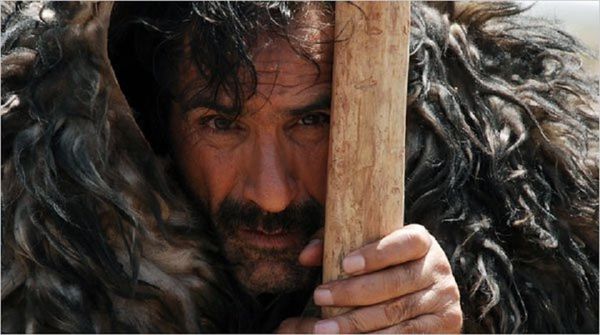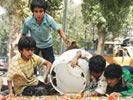Eye For Film >> Movies >> The Song Of Sparrows (2008) Film Review
The Song Of Sparrows
Reviewed by: Maryam Ghorbankarimi

The Song Of Sparrows is the latest film from Iran’s only Oscar nominated director, Majid Majidi (Children Of Heaven). Majidi’s lyrical storytelling has once again brought to the silver screen a beautifully crafted tale of an honest and hardworking man who has drifted from his path and has become corrupted by the capitalist way of life in the smoky and busy city of Tehran.
Karim (Reza Naji), who lives in a village west of Tehran in a small house with his wife and three kids, works at an ostrich farm. His life suddenly changes when he is fired from his job when an ostrich escapes while under his care. He makes every effort to find the runaway ostrich, but he is unsuccessful. One day he goes to the city to have his daughter’s hearing aid repaired, and a busy businessman mistakes him for a motorcycle taxi driver. He decides to continue working as a motorcycle taxi driver, finding it quite lucrative. Traveling in the heavy traffic of Tehran to different corners of the city while transporting consumer products and listening to people shouting on their mobile phones increases his desire for accumulation. He goes home every evening with a piece of junk he has found in the city, piling them up in his backyard. Much to the shock of his family, he transforms and loses his generous and honest nature, until one day he gets into an accident and is forced to reflect on his life.

This film is filled with symbolism of life, hope, and desire. The title of the film, as Majidi explains, is a paradox because sparrows don’t sing and it has been used symbolically to convey the desire people may have for what it is not even physically possible for them to achieve. In the subplot, Karim’s son and his son’s friends try to empty the sludge from an old water storage tank to breed fish in it, in the hopes of becoming millionaires when the fish multiply. The boys’ hard work in achieving what they have set their hearts on restores Karim’s faith and sense of purpose. Their vain attempts to save the fish when their plastic container is broken awakens him, and, in a beautiful scene in the back of a moving van, he sings a song to cheer up the boys, reminding them that the world is a dream and a lie.
Majidi is honest to his own style of filmmaking, which falls under the category of films defined as the New Iranian Cinema, following the works of directors such as Abbas Kiarostami. The use of mostly non-professional actors keeps the story believable by way of their realistic performances. This beautifully shot film also presents colourful and lively shots of the village and the scenic mountains in juxtaposition with the cluttered and ugly grey shots of Tehran. As usual, Majidi’s characters speak much more through the environments they inhabit than through dialogue, allowing his films to be easily understood worldwide. The fast cuts in the city scenes versus the static and long shots of the village, along with music by Grammy nominated composer Hossein Alizadeh, conveys the chaos and turmoil of the modern world.
Although the film may seem to be sentimental at times, and although its plot is simple, it is still quite entertaining and rewarding in its conclusion.
Reviewed on: 20 Jun 2008














